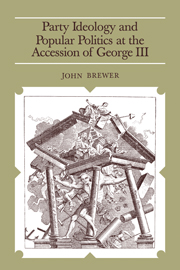Book contents
- Frontmatter
- Contents
- Preface
- A note to the reader
- PART I INTRODUCTION
- PART II THE RECONFIGURATION OF POLITICS
- PART III AN ALTERNATIVE STRUCTURE OF POLITICS
- PART IV FOCUSSED RADICALISM
- 9 Personality, propaganda and ritual: Wilkes and the Wilkites
- 10 American ideology and British radicalism; the case for parliamentary reform
- PART V TWO POLITICAL NATIONS
- PART VI CONCLUSION
- Notes
- Bibliography
- Index
10 - American ideology and British radicalism; the case for parliamentary reform
Published online by Cambridge University Press: 15 December 2009
- Frontmatter
- Contents
- Preface
- A note to the reader
- PART I INTRODUCTION
- PART II THE RECONFIGURATION OF POLITICS
- PART III AN ALTERNATIVE STRUCTURE OF POLITICS
- PART IV FOCUSSED RADICALISM
- 9 Personality, propaganda and ritual: Wilkes and the Wilkites
- 10 American ideology and British radicalism; the case for parliamentary reform
- PART V TWO POLITICAL NATIONS
- PART VI CONCLUSION
- Notes
- Bibliography
- Index
Summary
The inequalities in the representation of one country are no reason for rejecting the representation of another … we are not to reason from defect to defect, thereby making the political system still more and more defective.
([W. Bollan], Succinct View of the Origin of our Colonies (1766), 25)The decade of the 1760s saw the emergence of a number of new political issues which were to clarify, even to harden, the new political lines that had been drawn at the beginning of George III's reign. Of these new issues, undoubtedly one of the most important was the imperial problem posed by the North American colonies.
The American question can be, and indeed was approached in a variety of ways. It could, for example, be seen in geo-political, strategic terms. During the prolonged and occasionally extremely acrimonious discussions that surrounded the peace negotiations at the end of the Seven Years War, the thirteen colonies were discussed in precisely this way. The government's decision to plump for hegemony on the North American continent by retaining the whole of Canada, and to content itself with a holding operation in the West Indies, placed the Americans at the very centre of the British imperial design.
Yet this momentous geo-political decision raised other questions about America which were of an administrative and financial nature. The acquisition of very considerable new territories had only been achieved after major military and naval operations; with peace the ambit of imperial administration had inevitably been extended.
- Type
- Chapter
- Information
- Publisher: Cambridge University PressPrint publication year: 1976
- 2
- Cited by



